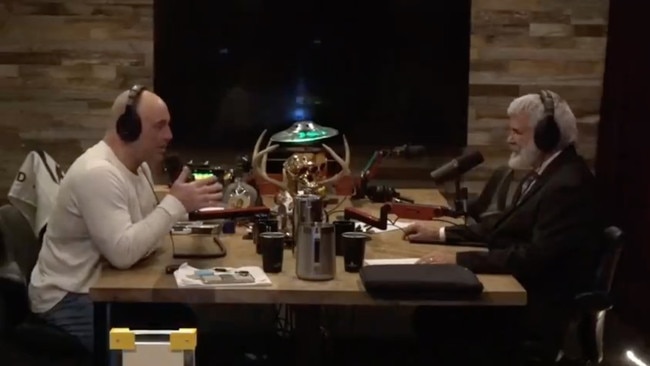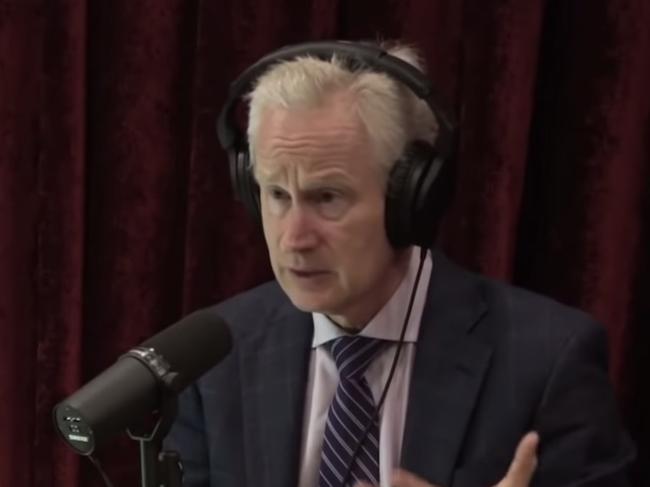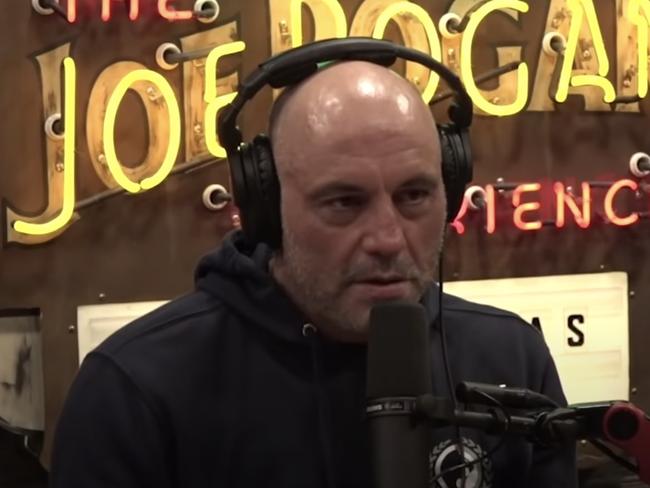Professor of epidemiology weighs in on recent claims made on The Joe Rogan Experience
A professor of epidemiology has weighed in on the Joe Rogan Covid-19 saga after recent episodes attracted a tidal wave of attention.
Online
Don't miss out on the headlines from Online. Followed categories will be added to My News.
As medical professionals call for Spotify to shut down podcast giant Joe Rogan after they slammed a series of recent interviews for “spreading misinformation”, a top US epidemiologist has sought to set the record straight on a number of the claims made in the podcasts.
In recent weeks, the comedian and UFC commentator who also has the popular podcast The Joe Rogan Experience, has come under heavy fire for airing hours of interviews with Covid sceptics Dr Peter McCullough and Dr Robert Malone.
A group of 270 medical professionals urged Spotify to put a stop to the “dangerous” health advice shared on Rogan’s show and stop promoting “baseless conspiracy theories”.
This came after early reports claimed the three-hour interview with US cardiologist Dr McCullough racked up over 40 million views on Spotify in its first week in December.
Rogan moved his podcast to the streaming service in late 2021.
Now University of California associate professor of epidemiology and biostatistics Vinay Prasad has sought to clear the air on the topic, addressing the main claims made by both Dr McCullough and Dr Malone over the course of the six hours of podcasts.
Dr Prasad, who hosts a medical show on YouTube with 100,000 followers, criticised efforts to censor “misinformation” in the scientific community, saying it was better to answer false claims rather than silence them.
He also cited the two polarising figures’ medical credentials.
“Malone is a physician who has worked in molecular biology and drug development for decades,” he said in a 3000-word column for UnHerd. “McCullough was, until recently, an academic cardiologist and researcher.
“Both speakers made accurate and useful points on Rogan’s podcast – as well as unsupported, speculative, alarmist and false ones,” he wrote.
“The correct way to deal with incorrect ideas in biomedicine, if they rise to a level of prominence that warrants rebuttal, is to rebut them.”

Suppression of early treatment medication
Dr McCullough has been vocal about trialling pre-existing medicines for early treatment of coronavirus.
“Both doctors allege that public health authorities have intentionally suppressed the use of these drugs,” Dr Prasad said.
In addressing Dr Malone’s claim that hospitals were rejecting early treatment medications because they profit when people are hospitalised, Dr Prasad said: “These are entirely false and insulting allegations, and Malone’s in particular are flat-out conspiratorial.
“Academic hospitals attempted all sorts of disparate treatment protocols in the hopes of helping sick patients. Many physicians did not wait for randomised control trials – the gold standard of medicine – to act; they simply acted. In fact, a Harvard hospital recommended hydroxychloroquine prior to randomised data.”
In Australia, NSW Health’s current advice for treating Covid-19 at home is to take paracetamol, ibuprofen, get some bed rest and only seek medical help when your infection becomes severe. For high-risk patients, the use of sotrovimab, an IV infusion, was approved last year. And this week, two new oral medicines, Paxlovid and Lagevrio, have been approved by the Therapeutic Goods Administration (TGA) with doses expected to arrive in Australia in the coming weeks.
The ivermectin question
In terms of controversial drug ivermectin, Dr Prasad said current trials “have not yet shown persuasive evidence of benefit”.
“Rogan, Malone and McCullough are wrong to claim that ivermectin and hydroxychloroquine are known to be secretly effective, but they are correct that these drugs have been unfairly demonised,” he said.
“The truth is that they are neither particularly dangerous nor effective. The media labelling ivermectin a ‘horse dewormer’ was particularly absurd. Ivermectin is a well-known drug taken by humans all over the world.”
The TGA warned Australians of self-medicating with ivermectin after alternative news sources began promoting the drug online in 2021.
“The TGA strongly discourages self-medication and self-dosing with ivermectin for Covid-19 as it may be dangerous to your health,” a statement said.
“[There is] no meaningful evidence for clinical activity or clinical efficacy in patients with Covid-19 disease, and a concerning lack of safety data in the majority of studies.”

Boosters, myocarditis and vaccine discussion
Both Dr McCullough and Dr Malone shared scepticism over the current crop of vaccines being used worldwide, claiming the risks and side effects were being downplayed.
Both have warned against recommending or requiring boosters for the general population, citing the lack of data on the long-term effects of current vaccine technologies when applied to billions of people.
Dr Prasad said it is “perfectly valid to question the wisdom of boosters, at least in young people”.
“Such concerns are not limited to the fringe,” he said, referencing recent moves by France and Germany to suspend the use of Moderna in males under 30 due to the amplified risk of heart issues such as myocarditis – inflammation of the heart muscle.
“Like Malone, I have seen researchers smeared as ‘anti-vaxxers’ for simply suggesting that myocarditis is a real safety concern, or that we don’t know the optimal duration and dosing strategy of vaccination, particularly for young and healthy people and those who have recovered from infection.
“Malone and Rogan are correct that the media dismisses concerns over myocarditis by claiming that most cases are ‘mild’, when in fact it is too early for us to know the full effects.”
According to the TGA, myocarditis – which it describes as “very rare” – is reported in about one to two out of every 100,000 people who receive Pfizer and two to three out of every 100,000 who receive Moderna in Australia.
According to the US Centres for Disease Control and Prevention (CDC), the risk of myocarditis after infection with Covid-19 is much higher than after vaccination.

‘Unfair censorship’ on Covid-19 debate
Dr Prasad also said that handing the role of censorship over to social media platforms and tech companies has created its own host of issues, as they are often “unaccountable” and susceptible to bias.
“This is especially true in science, where, as history shows us, consensus views can turn out to be false, while controversial or heretical ideas can be vindicated,” he said.
“There is tremendous potential for abuse. The same tools used to suppress scientific ‘misinformation’ may some day be used to solidify political power and stifle dissent.”
Dr Malone was removed from Twitter at the end of last year for violating the platform’s rules, just one day before his appearance on Rogan’s podcast.
But Dr Prasad argued that despite the cancellation, the polarising figure’s voice is now more heard than ever.
7. Censorship is out of control
— Vinay Prasad, MD MPH 🎙ï¸ðŸ“· (@VPrasadMDMPH) January 19, 2022
Absolutely agree. Censoring speech is reckless and insane.
The censors do not have the qualifications to censor, and it will be abused
Malone, Rogan & McCullough are spot on pic.twitter.com/da2TBlsZmd
“The efforts to censor Malone and McCullough have massively backfired, with both men gaining prominence and publicity from the attempts to shut down their speech,” he said.
“More generally, I strongly disagree with efforts to censor scientists, even if they are incorrect, and no matter the implications of their words, as I believe the harms of censorship far exceed any short-term gains.
“Disagreement on these questions is natural, and attempts to suffocate ‘harmful’ speech run the risk of stifling critical debates, including by silencing third parties who may have important contributions but who fear the professional or reputational consequences of speaking up.”
Originally published as Professor of epidemiology weighs in on recent claims made on The Joe Rogan Experience




